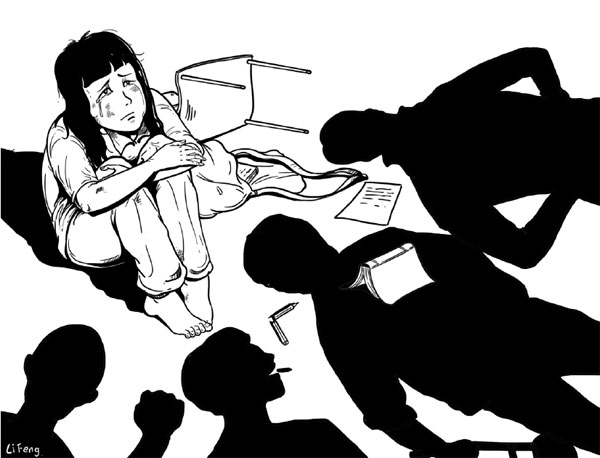Handling of bullies varies at home, overseas
Updated: 2015-09-30 08:26
By Cao Yin and Luo Wangshu(China Daily)
|
|||||||||||
Chinese teens try to settle their problems outside the law, security consultant says
Three students accused of abducting and torturing a fellow Chinese classmate in a brutal case of campus bullying in the United States have put a spotlight on the way students attempt to resolve disputes, both overseas and in China.
In the US, the Chinese students are to be tried near Los Angeles for attacking an 18-year-old woman who was beaten, stripped naked and burned with cigarettes. They have pleaded not guilty to the charges. The high-profile case has prodded a discussion in the US and China about the behavior of Chinese students in the US, how domestic bullying cases are handled and the gang-like behavior that experts say sometimes results when teens are far from home and the watchful eyes of their parents.
Experts specializing in juvenile education and protection said Chinese students are often unaware of laws against such abusive behavior, both at home and abroad.
In the US case, the defendants did not realize their behavior had broken local laws, said Li Zhenxin, chief security consultant at DZ Security Group, China's first overseas security service provider.
"Under US law, restraint of another's liberty is a felony," Li said.
Young people are ignorant of the laws they are breaking when they participate in bullying, said He Chugang, a manager for the South China region of Amber Education, an overseas studies consulting agency.
Wang Leilei, a Beijing prosecutor who has handled cases of campus violence, said there are different ways that domestic and overseas schools deal with campus bullying.
"How to tackle such cases and what attitude a school should have will impact the future of students involved," Wang said.
Overseas education
The number of Chinese students studying abroad has skyrocketed since 2008, and the age of the average student is becoming younger. The Ministry of Education said China had 459,800 students studying abroad last year. More than half of those were in the US.
In Li's view, the number of badly behaved Chinese students abroad are few, but those are the ones most likely to stick together and become a gang-like group, especially the younger ones who are lonely.
"They tend to find the group a comfort," he said.
When students have disputes, they solve the problems in their own way, with the assistance of the gang, he said.
Domestic and overseas schools deal with bullies differently, said He, from Amber Education.
"In the US, students usually report their disputes and ask their school and the campus police or even local public security officers to solve the disagreements," He said. "Or overseas schools tend to handle the bullies in judicial ways if the situation is serious."
Students involved in bullying behaviors will realize their offenses have broken laws in ways that go beyond simple school discipline, he said.
"Chinese people value guanxi, or connections, but in Western countries these cannot help solve problems or alleviate conflicts," he said.
Some conflicts center on money, He said.
"Children sometimes like to show off their family wealth, which may trigger friends' jealousy. Or even worse, bad friends will kidnap rich kids and ask for ransom," he said.
Although the US case received attention around the world, violent cases are actually more common in domestic schools, He said.
Chinese approach
Campus bullying has long been a serious issue in Chinese schools, but schools have tended to hide such behavior. Students are allowed to solve their interpersonal problems in their own ways, by fighting or arguing, experts said.
When students fight or have conflicts, teachers want to avoid tarnishing the school's reputation and tend to hide such incidents, He said.
Students usually are punished in an administrative way, such as making a record of bad behavior. The worst penalty is expulsion, He said.
At a speech in the capital's Chaoyang district in April, Wang, the prosecutor, said she learned of a school that internally handled a case in which several boys in a higher grade bullied a younger boy and injured him with a knife.

"The school didn't report the incident to judicial bodies, let alone deal with it in legal procedures," she said.
She had a talk with the older students and was shocked and saddened to see these students behave in a boisterous manner.
"They did not realize what they did was wrong and that they could be even charged with the crime of intentional injury under the current Chinese Criminal Law," she said.
For those who injure others for the first time and feel shame for their actions, penalties can be lenient, "or we can ask them to do some volunteer work in communities as the punishment, or seal their criminal records," Wang said.
The latest amendment to the Criminal Law has set up a special section for young offenders, providing different punishments for different behaviors, "but the point is that we must tell them their offenses can be considered crimes," she said.
"Many tragedies on campus are triggered by bullies or small conflicts, such as robbing mobile phones or money. If we don't stop them the first time, more injuries will take place," she said.
Yan Qingwu, a lawyer from Beijing Rainbow Law Firm, said many schools and colleges in China lack basic legal training, and students have not been taught what constitutes criminal behavior.
Meanwhile, some parents, especially those with less education, do not know the correct way to guide their children when they have a dispute with a classmate, Yan said.
Schools and parents should handle bullies in legal ways and improve their daily family lives, giving youngsters a better environment in which to grow up, he said.
Contact the writers at luowangshu@chinadaily.com.cn

(China Daily 09/30/2015 page5)
Today's Top News
China marks Martyrs' Day at Tian'anmen Square
Ten industries prioritized for upgrading manufacturing ability
Hong Kong tycoon rejects claims about divestment from mainland
Beijing tops China's hourly minimum wage
Obama, Putin meet at UN on Syria, Ukraine
Former FIFA powerbroker Warner banned for life
China to set up $1b peace fund
VW settles for 'old boy' Mueller to steer company out of trouble
Hot Topics
Lunar probe , China growth forecasts, Emission rules get tougher, China seen through 'colored lens', International board,
Editor's Picks

|

|

|

|

|

|






